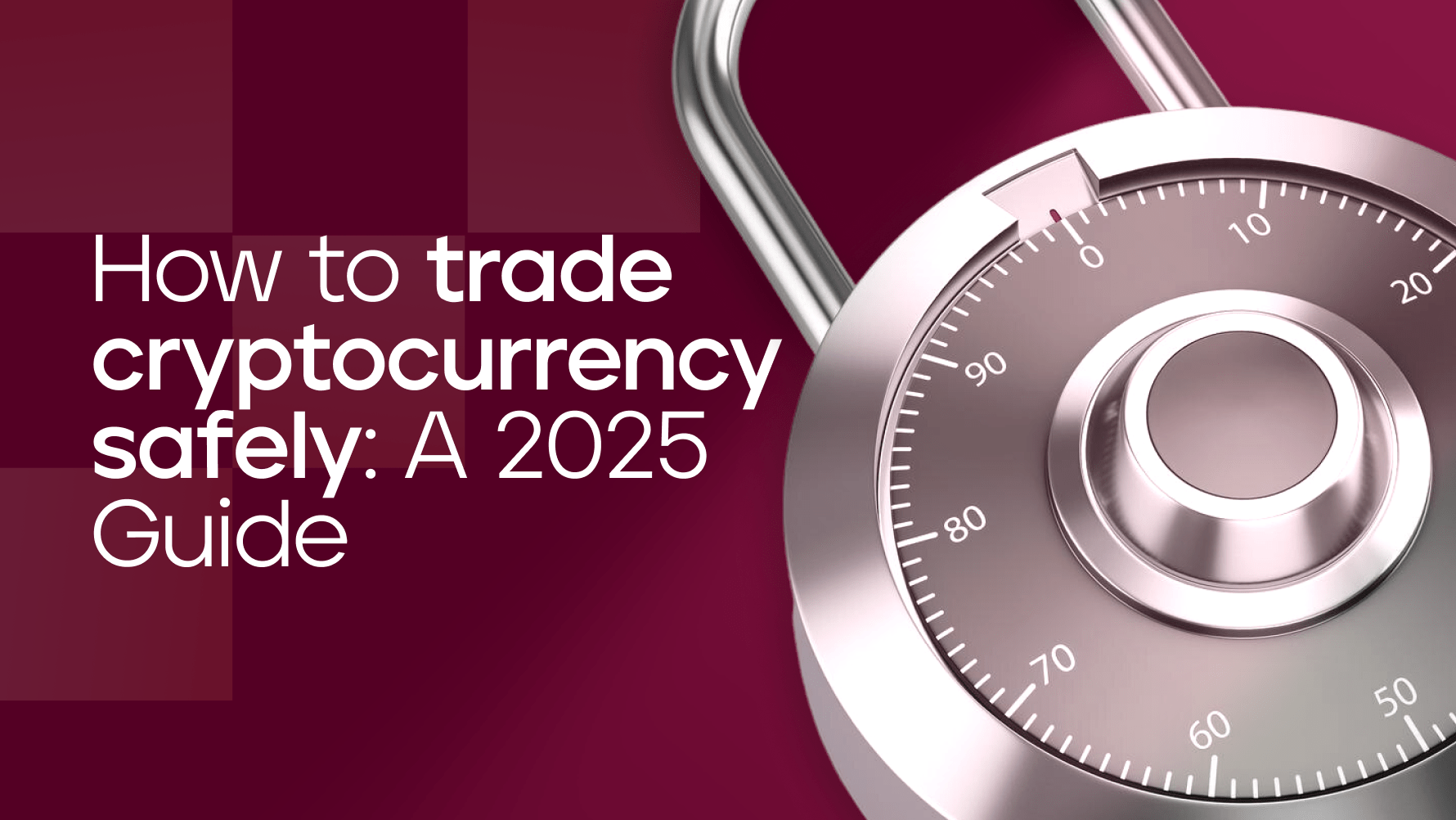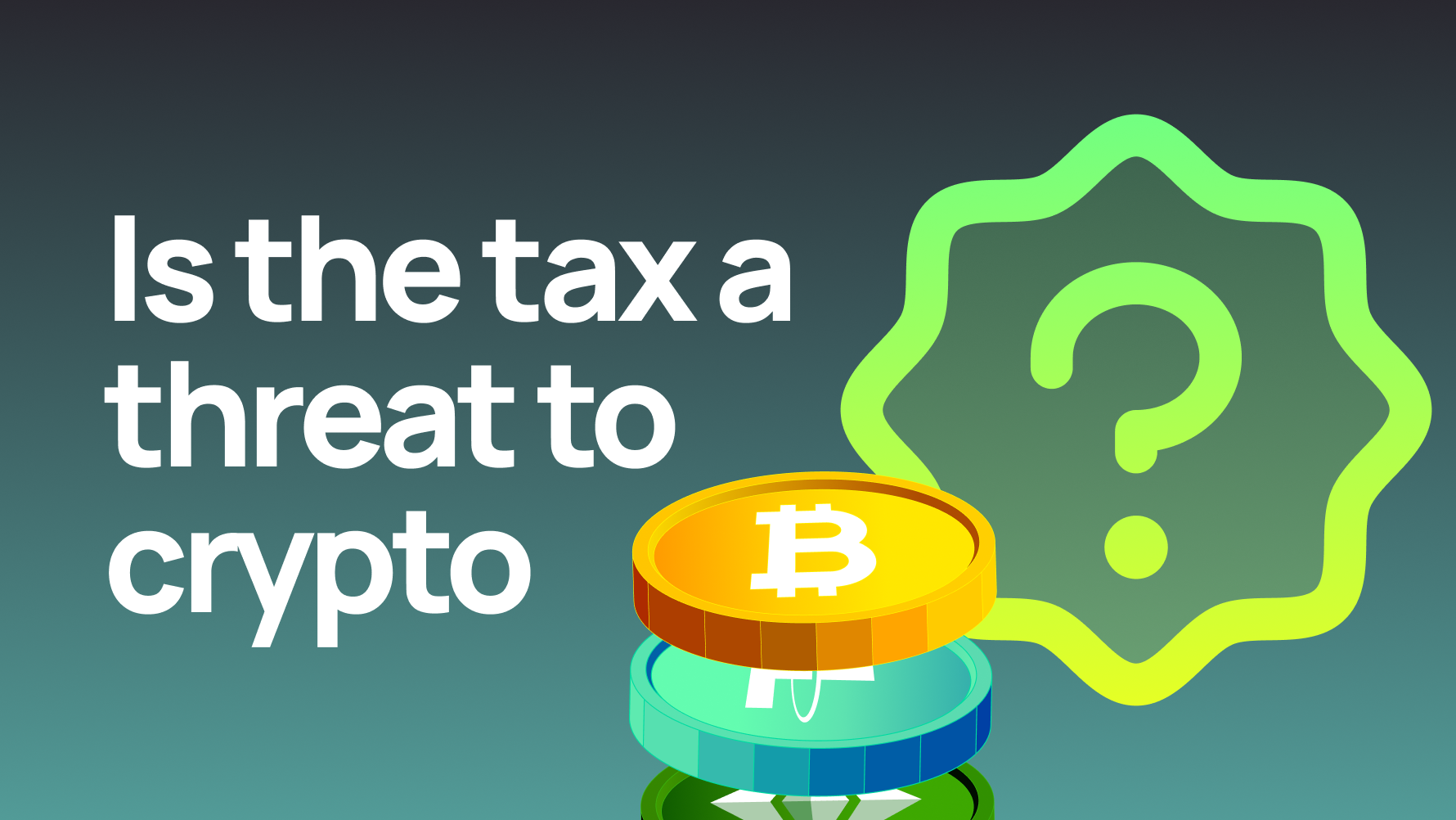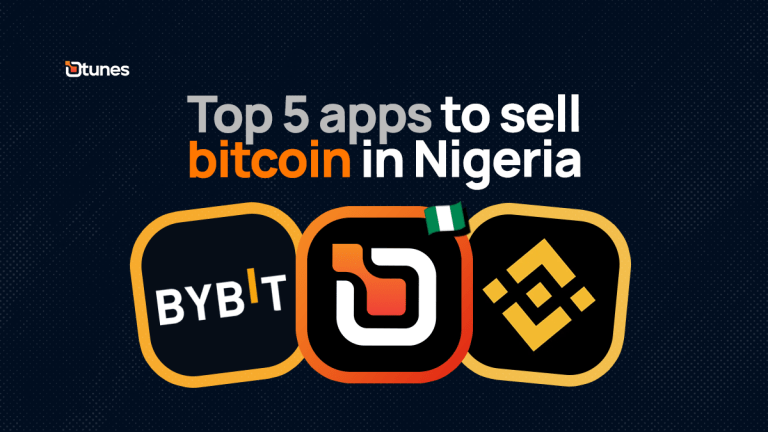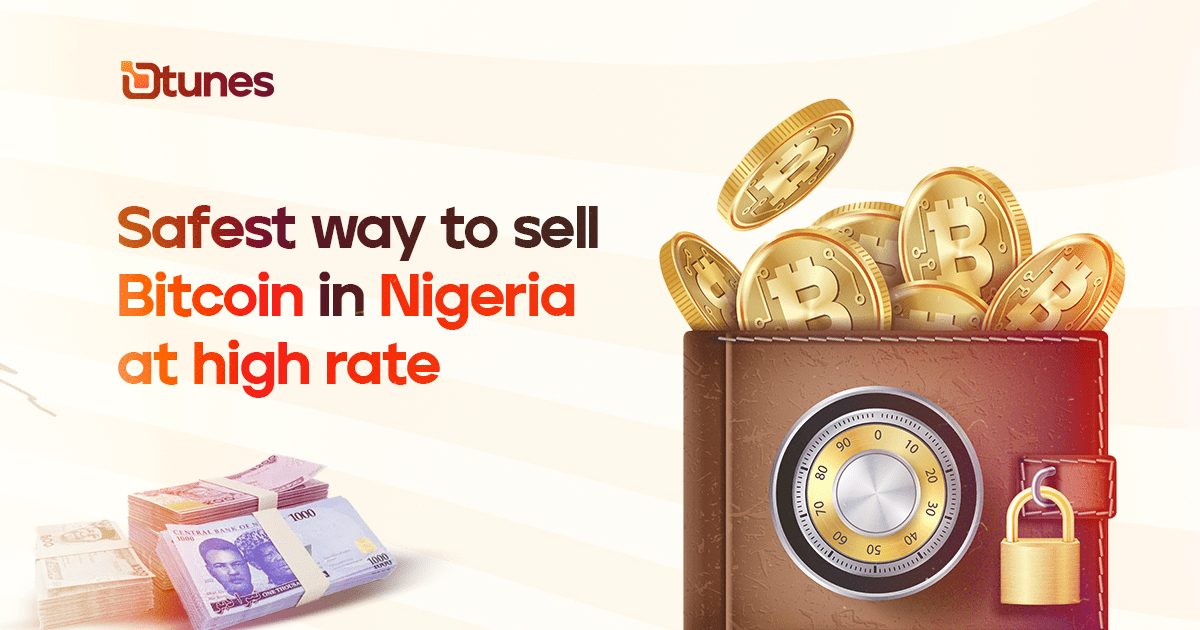
How To Trade Cryptocurrency Safely: A 2025 Guide
Cryptocurrency theft reached $1.7 billion in 2024, with most losses traced back to preventable security mistakes rather than sophisticated hacking. Your trading success depends less on picking winning coins and more on protecting what you’ve already earned.
This guide walks you through choosing secure platforms, setting up proper authentication, managing risk through position sizing, and storing your assets safely—everything you need to trade confidently without constantly worrying about losing your funds.
You can also find out:
What Is Cryptocurrency Trading
Cryptocurrency trading means buying and selling digital assets like Bitcoin or Ethereum through online platforms to profit from price changes. Unlike long-term investing where you hold coins for years, trading involves more frequent transactions based on market movements. The process happens entirely online through exchanges that match buyers with sellers, similar to how stock markets work but operating 24/7.
When you trade crypto, you’re working with digital currencies secured by blockchain technology. A blockchain is essentially a digital ledger that records every transaction across thousands of computers simultaneously. This system makes it nearly impossible to fake transactions or spend the same coin twice.
Most beginners start on centralized exchanges, which act as intermediaries between traders. You place either a market order (buying immediately at the current price) or a limit order (setting your preferred price and waiting for someone to match it). The exchange handles the technical details while you focus on deciding what to buy and when to sell.
Trading differs from investing mainly in your timeline and approach. Traders actively monitor prices and make multiple moves each week or month. Investors typically buy cryptocurrency and hold it for extended periods, checking in occasionally rather than daily. Both paths require strong security practices, though traders face extra risks from keeping funds accessible and interacting with platforms frequently.
Why Security Matters In 2025
Once someone steals your cryptocurrency, you can’t get it back. There’s no bank to call, no fraud department to reverse the transaction, no insurance policy to file a claim with. The blockchain records every transfer as permanent and irreversible, which protects against double-spending but also means mistakes and thefts stick.
Hackers have gotten more sophisticated over the past few years. They create fake websites that look identical to legitimate exchanges, changing just one letter in the URL. They send emails pretending to be customer support, asking you to “verify” your account by entering your password. They even hijack phone numbers through a technique called SIM swapping, which lets them receive your text message security codes.
Here’s what makes crypto security different from protecting your bank account:
- No chargebacks: Credit card companies can reverse fraudulent charges, but blockchain transactions finalize within minutes and stay permanent
- You’re the bank: Traditional banks employ security teams and maintain insurance, while crypto traders handle their own protection
- Global access: Anyone anywhere can attempt to access your account, not just local criminals who might physically steal your wallet
Nigeria’s Securities and Exchange Commission now requires crypto platforms to register and follow specific security standards. This regulatory oversight means legitimate exchanges implement proper safeguards and undergo regular audits. While some traders view identity verification as invasive, it actually reduces fraud by making it harder for criminals to open accounts and launder money.
Read More: Is Dtunes Legit
Steps To Start Trading Crypto Safely
1. Set Up A Secure Account
Your platform choice determines your baseline security before you deposit a single naira. Look for exchanges registered with Nigerian financial authorities that display clear licensing information. Platforms like Dtunes use bank-level encryption and require OTP verification for every transaction, adding layers of protection that make unauthorized access extremely difficult.
Create a new email address exclusively for crypto trading. Don’t reuse an email you’ve given to shopping sites, social media, or newsletters. Your password needs at least 16 characters mixing uppercase, lowercase, numbers, and symbols, but avoid obvious patterns like “Password123!” or anything related to your birthday or name.
2. Verify Your Identity And Enable 2FA
Identity verification links your account definitively to you, which actually makes it more secure. You’ll upload a government-issued ID and sometimes a selfie or proof of address. Most platforms verify these documents within a day or two. This process, called KYC (Know Your Customer), helps prevent fraud and ensures compliance with financial regulations.
Two-factor authentication (2FA) adds a second layer beyond your password. Download Google Authenticator or Authy rather than relying on SMS codes, which hackers can intercept by hijacking your phone number. After you enable 2FA, the platform shows you a QR code that your authenticator app scans. The app then generates time-sensitive codes that change every 30 seconds. Even if someone steals your password, they can’t log in without the current code from your phone.
3. Fund Your Account With Fiat Or Crypto
Bank transfers offer the most secure way to deposit naira into your trading account. The connection between your verified bank account and exchange account creates a clear record and typically costs less than card payments. Start small—maybe ₦10,000 to ₦50,000—until you’ve completed a few trades and feel comfortable with how the platform works.
If you already own cryptocurrency, you can deposit it by generating a wallet address from your exchange account. Triple-check that you’re using the correct blockchain network before sending. Bitcoin sent to an Ethereum address disappears permanently. Always send a tiny test amount first, wait for it to arrive, then transfer the rest.
4. Place Your First Trade On A Low-Volatility Pair
Start with Bitcoin or Ethereum rather than obscure altcoins. Major cryptocurrencies have deeper markets and more predictable behavior, which matters when you’re still learning how the interface works. You might even begin by converting naira to USDT (a stablecoin pegged to the US dollar), then use that USDT to buy Bitcoin once you’re ready.
The trading interface shows you the current market price, recent transactions, and options to buy instantly or set a target price. Watch the order book for a minute before clicking anything. You’ll see rows of pending orders at different prices, with the gap between the highest buy order and lowest sell order showing you how liquid the market is. For your first trade, use a market order so it executes immediately, then check how the transaction appears in your history.
Choosing A Trustworthy Platform
The platform you pick determines both your trading experience and your fundamental security. Centralized exchanges offer the most beginner-friendly setup, with customer support, insurance on deposits, and clear interfaces that walk you through each step. These platforms hold your private keys (the cryptographic passwords to your funds), which means you’re trusting their security but gaining convenience and recovery options if you forget your password.
| Platform Type | Security Features | Risks | Best For |
| Centralized Exchanges | Insurance funds, cold storage, 2FA, regulatory compliance, customer support | Platform controls your keys, single point of failure, requires identity verification | Beginners, frequent traders, anyone wanting instant swaps |
| Decentralized Exchanges | Self-custody, no KYC, transparent smart contracts | You handle all security, no support team, mistakes are permanent | Experienced users comfortable managing private keys |
| Hybrid Platforms | Partial self-custody, some support available | Complex interfaces, lower liquidity | Intermediate traders wanting partial control |
Regulation matters more than flashy features or high rewards. Platforms registered with Nigeria’s SEC maintain minimum capital requirements, undergo regular audits, and keep customer funds separate from operational expenses. Your deposits can’t be used for the company’s bills or investments, which reduces the risk of insolvency affecting your money.
Look beyond basic SSL encryption when evaluating security. Platforms worth trusting detail their cold storage policies (keeping 90%+ of funds offline), run regular penetration tests, and maintain bug bounty programs that pay security researchers for finding vulnerabilities. Transparency about past security incidents actually signals trustworthiness—platforms that acknowledge and learn from breaches demonstrate better long-term security than those claiming perfect records.
Storing Your Digital Assets And Using Secure Wallets
Your cryptocurrency doesn’t actually sit “in” a wallet. The coins exist on the blockchain, and wallets simply store the private keys that prove ownership and authorize transactions. This distinction matters because your security strategy centers on protecting those keys rather than the coins themselves.
Keeping funds on an exchange offers convenience for active trading but means the exchange controls your keys. The platform could theoretically freeze your account or suffer a breach that exposes your holdings.
Cold Wallet Vs. Hot Wallet
Hot wallets stay connected to the internet, enabling instant transactions but exposing your keys to potential online attacks. Mobile apps, desktop software, and exchange accounts all count as hot wallets. They work well for amounts you plan to trade within the next few weeks but aren’t suitable for large holdings you want to keep long-term.
Cold wallets remain offline, typically as hardware devices resembling USB drives or even paper printouts of your private keys. You physically connect the device each time you want to authorize a transaction, making remote hacking attempts nearly impossible. For amounts exceeding what you’d trade in a typical month, cold storage provides essential protection. The inconvenience of plugging in a device each time makes them impractical for daily trading, though.
Multi-Factor Authentication And Backup Keys
When you create a wallet, it generates a seed phrase—usually 12 or 24 random words that can restore your entire wallet if your device breaks. Write this phrase on paper, never store it digitally or take a photo. Keep the paper somewhere secure like a safe or bank deposit box. Anyone who finds your seed phrase gains complete control over your funds, so treat it like cash.
Here’s how to protect your wallet access:
- Seed phrase storage: Write on paper, keep in multiple secure physical locations, never type it into websites claiming to “verify” your wallet
- Device protection: Keep operating systems updated, avoid public WiFi when accessing wallets, use dedicated devices for crypto when possible
- Backup testing: Try recovering a small test wallet using your seed phrase before trusting it with significant funds
Biometric authentication (fingerprint or face recognition) adds convenience without sacrificing security since it works locally on your device. Still, biometrics work best as a supplement to your password and 2FA rather than a replacement.
Managing Risks And Volatility In Crypto Markets
Protecting your account access means nothing if poor risk management exposes your capital to unnecessary losses. Cryptocurrency markets operate 24/7, and prices can swing 10-20% overnight. This volatility makes protective measures essential even when trading on the most secure platform.
1. Position Sizing And Stop-Loss Orders
Risk no more than 1-2% of your total trading capital on any single position. If you have ₦100,000 in your account, each trade risks ₦1,000-₦2,000 in potential loss. This approach ensures that even several losing trades won’t devastate your account, giving you staying power to learn and improve.
Stop-loss orders automatically sell your position if the price drops to a predetermined level, capping your maximum loss. Set these immediately after entering every trade, not later when emotions might cloud your judgment. For example, buying Bitcoin at ₦50,000,000 with a stop-loss at ₦48,500,000 ensures you can’t lose more than 3% even if the market crashes while you sleep.
2. Avoiding Overleverage
Leverage lets you control positions larger than your account balance by borrowing funds from the exchange. While 10x leverage sounds attractive—turning ₦10,000 into ₦100,000 of buying power—it also means a 10% price move against you wipes out your entire position. Beginners face enough challenges without adding leverage’s complexity and risk.
If you eventually use leverage, start with 2x or 3x maximum and only on positions with strict stop-losses. Leveraged positions incur borrowing fees that eat into profits, and exchanges can liquidate your position automatically if the market moves against you.
3. Diversifying Your Portfolio
Spreading capital across multiple cryptocurrencies reduces the impact of any single asset’s poor performance. Rather than putting everything into Bitcoin, you might allocate 40% to Bitcoin, 30% to Ethereum, 20% to stablecoins, and 10% to carefully researched altcoins. Diversification won’t prevent losses in a market-wide crash, but it protects you from project-specific risks like regulatory crackdowns or technical failures.
Follow these principles consistently:
- Never invest more than you can afford to lose completely
- Start with small positions until you gain experience
- Use stop-loss orders on every trade without exception
- Consider dollar-cost averaging by buying fixed amounts regularly
How To Earn Rewards And Cashbacks While Trading
Beyond price appreciation, several mechanisms let you earn additional returns on your cryptocurrency holdings. Understanding how each works helps you decide which opportunities align with your security standards and trading style.
Exchange loyalty programs reward frequent traders with reduced fees, cashback on transactions, or bonus cryptocurrency for reaching volume thresholds. Platforms like Dtunes offer instant cashback on every trade, effectively reducing your transaction costs without requiring you to lock up funds or take additional risks. You trade, you earn—making this the most accessible reward mechanism for beginners.
Staking involves locking your cryptocurrency for a set period to support blockchain network operations, earning yields typically ranging from 4-12% annually. Legitimate staking through major platforms carries moderate risk, primarily the opportunity cost of locked funds during price movements. Only stake amounts you plan to hold long-term anyway, and verify that the platform maintains insurance or security guarantees on staked assets.
Here are the main reward mechanisms and their security profiles:
- Exchange loyalty programs: No lock-up period, immediate rewards, platforms like Dtunes provide automatic cashback
- Staking rewards: Requires locking funds, yields vary by cryptocurrency, use only established platforms with clear unstaking procedures
- Referral programs: Earn when friends sign up and trade, creates passive income without additional capital
Avoid programs promising unrealistic returns like 20%+ monthly or requiring you to recruit others to earn. Legitimate rewards come from transaction fees, network operations, or marketing budgets—not from new user deposits funding earlier users’ returns.
Download the Dtunes app to start trading with instant cashback on every transaction, competitive rates, and bank-level security.
Secure Your Future In Crypto Trading
Long-term security requires ongoing attention rather than one-time setup. Schedule quarterly security audits where you review passwords, update software, check that 2FA remains enabled, and verify your backup seed phrases stay secure and legible. Regular check-ins catch vulnerabilities before they become problems.
Stay informed through official channels rather than social media rumors or Telegram groups promoting specific coins. Follow your exchange’s official blog and social media accounts for security updates. When you hear about a new security threat, take immediate action to protect yourself.
Tax compliance forms part of your security strategy since proper record-keeping protects you from regulatory issues that could freeze your accounts or result in penalties. Most exchanges provide transaction history exports that detail your trades, making it easier to calculate capital gains and report them accurately. Keep these records for at least five years, stored securely offline alongside your other important financial documents.
Consider this ongoing security checklist:
- Regular audits: Review account settings quarterly, update passwords annually, verify backup seed phrases remain accessible
- Stay informed: Follow exchange security announcements, subscribe to reputable crypto security newsletters
- Tax compliance: Download transaction histories monthly, maintain organized records of all trades
- Continuous learning: Complete one security-focused course or article monthly, practice new techniques on small amounts first
The cryptocurrency landscape continues evolving, with new opportunities and new threats emerging regularly. Your commitment to security practices determines your long-term success more than technical knowledge alone.
FAQs About Safe Crypto Trading
What is the most secure type of cryptocurrency exchange?
Regulated centralized exchanges with insurance funds, cold storage for most assets, and mandatory 2FA provide the strongest security for most traders, though self-custody through hardware wallets offers maximum control for those comfortable managing their own keys.
How much money should beginners start with when trading crypto?
Start with 1-5% of your investable assets or an amount you could lose completely without affecting your financial stability—typically ₦10,000 to ₦50,000 for most Nigerian beginners allows meaningful learning without excessive risk.
What security measures should every crypto trader implement?
Enable 2FA using an authenticator app (not SMS), use unique strong passwords for crypto accounts, start with small amounts on new platforms, and never share your seed phrase or private keys with anyone.
How can I protect my crypto investments from market crashes?
Set stop-loss orders on every trade to limit maximum losses, diversify across multiple cryptocurrencies rather than concentrating in one asset, and only invest amounts you can afford to hold through temporary downturns.
Are hardware wallets necessary for casual crypto traders?
Hardware wallets become worthwhile once your holdings exceed ₦200,000-₦500,000 or represent a significant portion of your net worth, as the security benefits outweigh the ₦30,000-₦80,000 cost for protecting larger amounts.




